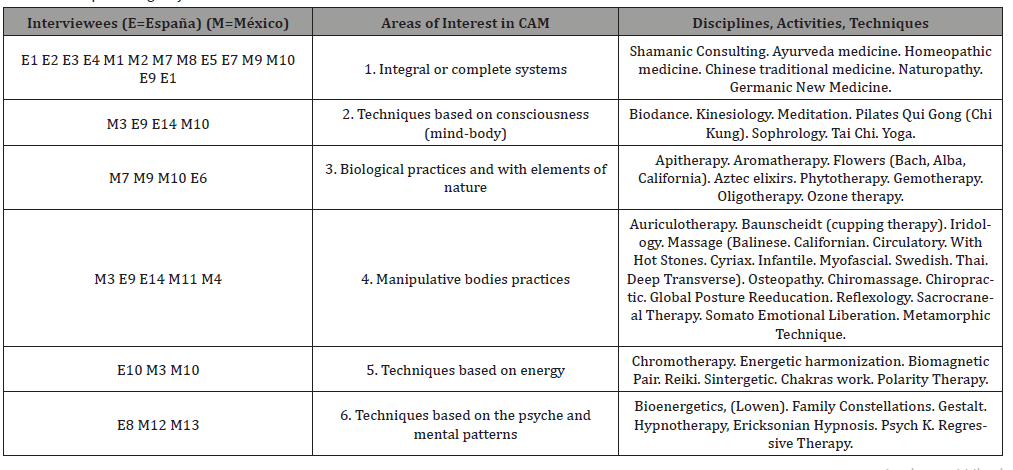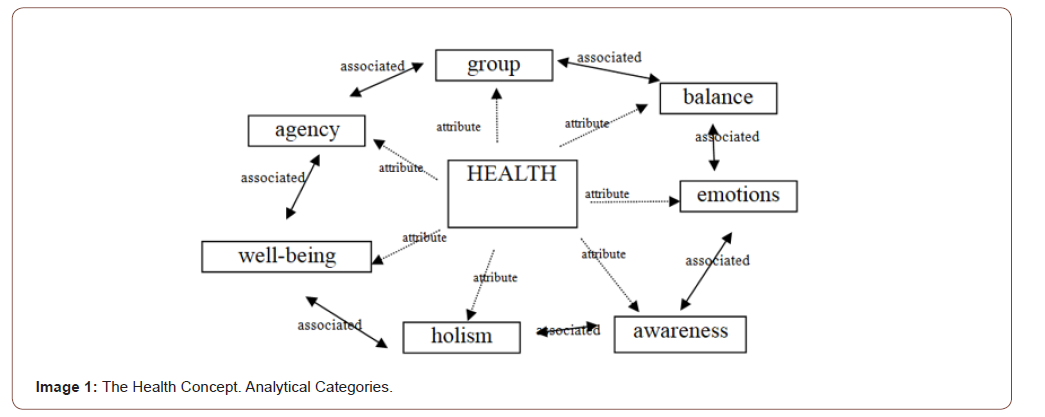 Research Protocol
Research Protocol
The Health Concept in the Complementary Medicine
Antonieta Ramíreza* and Belén Martínez
Pablo de Olavide University, Seville, Spain
Antonieta Ramírez, Pablo de Olavide University, Seville, Spain.
Received Date: July 21, 2020; Published Date: September 11, 2020
Abstract
Health is defined from current academy concepts and then is compared with the complementary medicine professional’s definition. In order to compare analysis of discourse of professional from Ciudad de México y Seville is carried out focusing in their complementary health cultural framework. The preliminary results show a positive and multidimensional concept of health and currently it is working finishing the analysis and reporting the conclusions.
Keywords:Complementary Medicine; Health Models; Qualitative Research.
Research Design
The subject of this qualitative research has been to know what is meant by health for professionals in complementary and alternative medicine (CAM). The fieldwork has been doing between the years 2014-2017. During this period, twenty-five in-depth interviews were conducted with professionals in the CAM field, whose areas of interest are those shown in [table 1]. The research design has been exploratory-descriptive and flexible [1, 2], which has allowed the incorporation of new categories of data [3], that is, new informants with new contributions where the design needed it. As well the flexible design has allowed including new “space of attributes” in the initial sample design [4,5].
[Table 1]
Methodological Assumption
The interviews have been carried out to professionals from Mexico City (Mexico) and from the city of Seville (Spain). Why? It starts from the methodological assumption that the territory does not differentiate the discourses, but it starts from the assumption that the formation of any concept is connected to cultural frameworks that allow a complete objectification of the experience [6]. The cultural framework where the concepts are attached transcends merely geographical borders, since the corpus of beliefs, expressions, norms, etc., is subject to the practice of CAM, regardless of where it is practiced.
Theoretical Assumption
The theoretical frame of the research establishes a descriptive research hypothesis: it focuses on examining the presence of similarities and differences between the predominant concept of health and that held by the interviewees. Therefore, what exists is compared with what is reported in the interviews. To this end a bibliographic review of the concept of health managed in the scientific community is made to make the comparison possible.
Progress in the Analysis of Results
The preliminary results of the analysis of the interviews show that CAM professionals have a multidimensional concept of health, similar to that described by authors such as [7-11]. The discourses of professionals allow inferring seven analytical categories in the definition of health presented in image 1: balance, group, agency, well-being, holism, awareness and emotions. The analysis is
currently still carried out with the help of ATLAS. Program, defining each of these categories according to the words of the interviewees and trying to show a theoretical construct of the concept of health based on the saturation of the discourses. Likewise, it will be verified if the methodological assumption of the territory differentiates the discourses or instead the cultural framework makes them similar [12,13].
[Image 1 & Table 1]
Table 1: Distribution of ever-married females by age group and gravida and para, Kampung Peninjau Lama, December 2013.


Acknowledgement
None.
Conflict of Interest
All authors declare no potential conflict.
References
- Valles MS (2000) Técnicas cualitativas de investigación social. Reflexión metodológica y práctica profesional. Madrid: Sí
- Ruiz JI (1996) Metodología de la investigación cualitativa. Bilbao: Universidad de Deusto.
- Yin RK (1993) Applications of Case Study Research. London: Sage.
- Sartori Gy, Morlino L (1999) La comparación en ciencias sociales (comsps., Ed.). Madrid: Alianza.
- Barton A (1980) Concepto del espacio de atributos en sociologí In P. Boudon, R. y Lazarsfeld [Ed] Metodología de las ciencias sociales. Barcelona: Laia.
- Pagis M (2010) From Abstract Concepts to Experiential Knowledge: Embodying Enlightenment in a Meditation Center. Qualitative Sociology 33(4): 469-489.
- Juárez F (2011) El concepto de salud: Una explicación sobre su unicidad, multiplicidad y los modelos de salud. International Journal of Psychological Research 4(1): 70-79.
- Moral MV (2008) Crítica a la visión dominante de salud-enfermedad desde la psicología social de la salud. Boletin de Psicologia 94: 85-104.
- Nordenfelt L (1997) On holism and conceptual structures. Scandinavian Journal of Public Health 25(4): 247-248.
- Rivera F (2011) Análisis del Modelo Salutogénico en España: Aplicación en Salud Pública e Implicaciones para el Modelo De Activos en salud. Rev Esp Salud Pública 85: 129-139.
- Yuste FJ (1988) Concepto de salud. Aldaba 6(10): 7-18.
- Asad A L, Kay T (2015) Toward a multidimensional understanding of culture for health interventions. Social Science and Medicine 144: 79-87.
- Ramírez A (2017) s. European Scientific Journal 13(5): 526-551.
-
Antonieta Ramírez, Belén Martínez. The Health Concept in the Complementary Medicine. On J Complement & Alt Med. 5(2): 2020. OJCAM.MS.ID.000608.
-
Complementary, Multidimensional, Analysis, Preliminary, Ciudad, Health, Steroids, Oral Steroids, Qualitative Research, Health Models, Cultural
-

This work is licensed under a Creative Commons Attribution-NonCommercial 4.0 International License.






